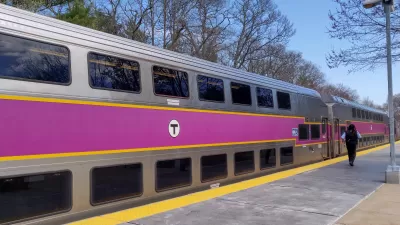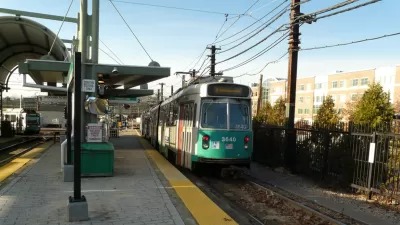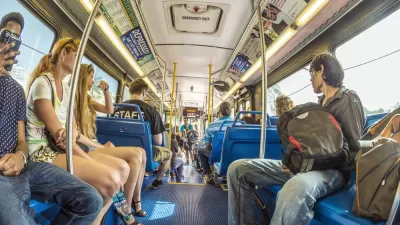Recently elected Boston mayor Michelle Wu, a bus rider herself, has the potential to be 'America's first actual climate mayor.'

Alissa Walker posits that Boston's newly elected mayor Michelle Wu, as a bus-riding, transit-friendly leader who wants to eliminate public transit fares, could be "America's first actual climate mayor."
Wu's version of the 'Green New Deal' for the city, writes Walker, "is effectively a localized, citywide pilot for the federal proposal: doubling the number of street trees, electrifying school buses, and incentivizing building retrofits, all led by a jobs program aimed at providing a just and equitable transition to a zero-emission economy that champions the city’s lowest-income workers." If Wu can meet her goals, Walker says, the city could see some transformative changes, including fare-free transit.
She’s already brought about two successful real-world examples of how this might work: a center-running dedicated lane to move buses faster than cars and a pilot project making congested routes free as a way to provide economic relief to transit-dependent Bostonians. She also wants to accelerate the rollout of Go Boston 2030, an ambitious plan meant to lay down networks of accessible sidewalks and safer bike infrastructure.
Walker is hopeful that, as an actual transit user, Wu will follow through on her bold promises and implement policies that will improve Boston's public transit and accelerate the city's progress toward its climate change goals.
FULL STORY: Michelle Wu Can Be America's First Actual Climate Mayor

Trump Administration Could Effectively End Housing Voucher Program
Federal officials are eyeing major cuts to the Section 8 program that helps millions of low-income households pay rent.

Planetizen Federal Action Tracker
A weekly monitor of how Trump’s orders and actions are impacting planners and planning in America.

Ken Jennings Launches Transit Web Series
The Jeopardy champ wants you to ride public transit.

Crime Continues to Drop on Philly, San Francisco Transit Systems
SEPTA and BART both saw significant declines in violent crime in the first quarter of 2025.

How South LA Green Spaces Power Community Health and Hope
Green spaces like South L.A. Wetlands Park are helping South Los Angeles residents promote healthy lifestyles, build community, and advocate for improvements that reflect local needs in historically underserved neighborhoods.

Sacramento Plans ‘Quick-Build’ Road Safety Projects
The city wants to accelerate small-scale safety improvements that use low-cost equipment to make an impact at dangerous intersections.
Urban Design for Planners 1: Software Tools
This six-course series explores essential urban design concepts using open source software and equips planners with the tools they need to participate fully in the urban design process.
Planning for Universal Design
Learn the tools for implementing Universal Design in planning regulations.
Heyer Gruel & Associates PA
Ada County Highway District
Institute for Housing and Urban Development Studies (IHS)
City of Grandview
Harvard GSD Executive Education
Toledo-Lucas County Plan Commissions
Salt Lake City
NYU Wagner Graduate School of Public Service





























